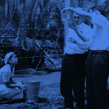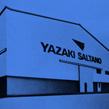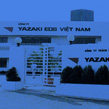Ceremony marking the opening of Thai Yazaki Electric Wire (1962)
Episodes in Yazaki’s global expansion
In this section, see various episodes in Yazaki’s
global expansion at a time when few Japanese companies did business overseas.
HOME Episodes in Yazaki’s global expansion Overseas expansion that also brings prosperity and profit to the local area: Validation of the Yazaki Way in Mexico.

1983 MEXICO
Overseas expansion that also brings prosperity and profit to the local area: Validation of the Yazaki Way in Mexico.

Full-scale production on the North American continent
Upon entering the 1980s, orders from American car manufacturers suddenly increased. Yazaki responded by building a North American factory and beginning local production of wire harnesses. It opened a factory in Ciudad Juárez, Mexico, near the border with the United States in 1983, and then continued to build factories throughout Mexico over the next ten years, eventually reaching a total of nineteen. With these factories, Yazaki rapidly turned into a company employing 6,000 workers. However, Yazaki is unlike other Japanese companies entering Mexico in that it engages in manufacturing by building its factories in remote desert locations some 200 or 300 kilometers from the border and employing local residents. Yazaki is the only full-scale company operating in those areas, and thus, in many cases, its factory management is closely linked to fluctuations in the local economy. It is said that a representative of an automaker who was on a tour of a Yazaki factory remarked wryly, “After crossing the border with Mexico, we saw nothing but desert no matter how far we went. The scenery never changed even after several hours. I became a little apprehensive about where they were taking me.”

Reaching even further into the interior
From the very beginning, managers of the Ciudad Juárez factory suffered one instance of culture shock after another. Workers thought nothing of spitting out sunflower seed shells on the floor while working. No one picked up trash. Tardiness and unexcused absences were commonplace. In fact, the concept of obeying work regulations was nonexistent. The attrition rate was extremely high, averaging 7% per month. As a result, no matter how recruiting was done, almost the entire workforce ended up being replaced within a year. The president in charge of the company at that time spent each day conducting recruitment exams and training new employees. It is said that pulling out of Mexico was seriously considered for a time amid questions about whether Yazaki-style factory management could be continued there.
However, as Yazaki struggled with these problems, more and more Japanese automakers were entering North America, and orders were pouring into Yazaki’s production center in Mexico. The volume was far greater than could be handled by the Ciudad Juárez factory alone, and thus Yazaki was pressed to build a second and then a third factory. When President Yasuhiko Yazaki flew in from Japan and was informed of the local circumstances, he issued the following clear order:
“Let’s go even further into Mexico. Let’s go in with Yazaki values.”
With this word from the top, Yazaki first expanded to Ascensión, in a more remote location approximately 200 kilometers from Ciudad Juárez. Its new factory there started with just 55 employees, a number that grew to almost 1,000 in a few years.
Turning community centers and movie theaters into factories
The former mayor of Ascensión who led the effort to bring Yazaki to his city speaks about the dramatic change that occurred there. “When Yazaki arrived, employment was generated, people’s income stabilized, and the number of homeowners increased. The city’s financial situation improved and funds could be spent on education. As a result, the city, which previously had only an elementary school, now has a junior high school and high school, and a plan to build a technical school is currently underway.”
After Ascensión, Yazaki next expanded its production bases to parts of the State of Chihuahua that were even more distant from the border. One of those bases was placed in the sleepy town of Galeana, located more than 200 kilometers south of Ciudad Juárez. An elderly man visited Yazaki many times to ask the company to come to his town. Finally, he brought with him a petition and said, “We’ll give you our community center to use as a factory.” The person in charge was so impressed by the man’s zeal that he went to Galeana, where he found not only the mayor and other important citizens, but also a throng of residents—young and old, men and women—waiting for him. They all implored Yazaki to come to their town. The entire town’s wish eventually came true (how could it be refused?) when Galeana’s community center was reborn as a factory. In another town, a movie theater was also converted into a factory.
Yazaki’s Corporate Policy embraces the concepts of being “A Corporation in Step with the World” and “A Corporation Needed by Society.” Simply moving factories to other countries where the wages are lower can never be sustainable. Thus, it is important to consider with sincerity what can be done in a country or area and then execute it. Done repeatedly, this builds a sense of reliability, and forms the foundation of a truly trust-driven relationship that will bring help in a time of need. This is Yazaki’s approach to overseas expansion.
EPISODE SELECTION
EPISODE 01 Yazaki takes its first step overseas to Thailand before the Tokyo Olympics.
EPISODE 03 American Yazaki steps forward at a time when “Made in Japan” had a poor reputation.
EPISODE 04 Yazaki is the first to enter the European market! Offense is the best defense.
EPISODE 06 Yazaki’s arrow mark makes its appearance in Gaia, Portugal.
EPISODE 07 Demonstrate and then let others take over: The Yazaki Way takes root in Vietnam.
EPISODE SELECTION















